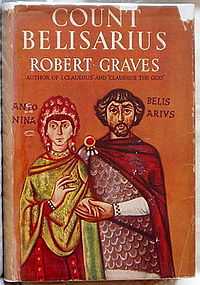Count Belisarius
 | |
| Author | Robert Graves |
|---|---|
| Country | United Kingdom |
| Language | English |
| Genre | Historical novel |
Count Belisarius is a historical novel by Robert Graves, first published in 1938, recounting the life of the Byzantine general Belisarius (AD 500–565).
Just as Graves's Claudius novels (I, Claudius and Claudius the God and his Wife Messalina) were based on The Twelve Caesars of Suetonius and other Roman sources, Count Belisarius is largely based on Procopius's History of Justinian's Wars and Secret History. (However, Graves's treatment of his sources has been criticized by the historian Anthony Kaldellis, who writes that "There are many historical novels set in the early sixth century, but none can be recommended that are both historically accurate and well-written. R. Graves's Count Belisarius... is at least well-written."[1]
Count Belisarius purports to be a biography written by Eugenius, a eunuch who is a servant of Belisarius' wife Antonina. The novel covers the entire life of Belisarius, with the bulk of the text being devoted to accounts of his life while on campaign in North Africa and Italy. Antonina was often with him during these years, and Graves uses stories about her connections to the court of the Emperor Justinian and his Empress Theodora to incorporate political intrigue and other information into the story of Belisarius' military exploits.
Graves's treatment of Belisarius is mostly respectful: the general is, if anything, hampered by his rigid code of honour and loyalty to his Emperor. Other primary characters do not fare so well. Antonina and Theodora are presented as extremely intelligent and capable individuals who are nevertheless prone to holding grudges and to jealousy. Justinian is portrayed as intelligent but reckless, a tragically poor judge of character, and a spendthrift, though driven by genuine piety. Graves recounts how Belisarius suffers trying to satisfy the whims of the two rulers, including the confusion following the command of Theodora, a Monophysite Christian, to depose Pope Silverius. At the height of the siege of Rome Belisarius has Silverius stripped of his vestments and exiled. An outcry forces Justinian to order him returned to Italy, but Theodora's replacement has already been appointed. Silverius is intercepted before he can reach Rome and is exiled once more. Belisarius, though he is just carrying out orders, is roundly condemned and builds a small oratory at Santa Maria in Trivio in Rome as a sign of his repentance.
Notes
- ↑ , Kaldellis's translation of Prokopios, The Secret History, with Related Texts, 2010, ISBN 1-60384-180-6, p. lxxix.
Further reading
- Graves, Robert; Count Belisarius, Farrar, Straus and Giroux, (1982 paperback) ISBN 978-0-374-51739-7
| ||||||||||||||||||